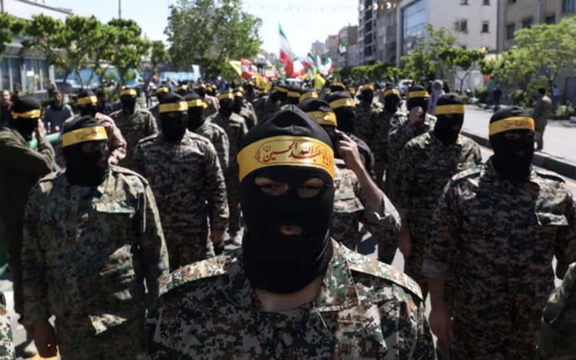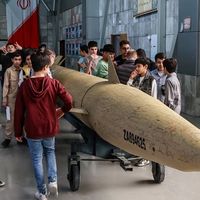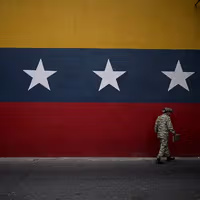Iranian Political Prisoners Condemn Sentencing Of Peer To Exile
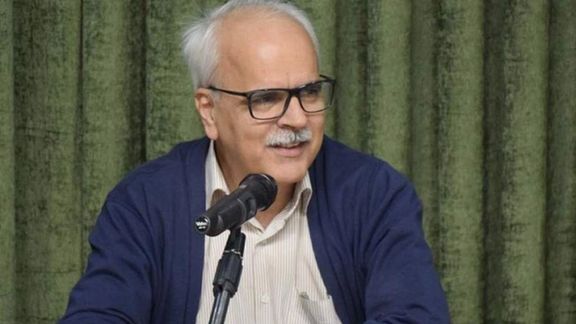
Several high profile political prisoners have voiced condemnation over the recent sentencing of Saeed Madani, a prominent university professor and political activist, to exile.

Several high profile political prisoners have voiced condemnation over the recent sentencing of Saeed Madani, a prominent university professor and political activist, to exile.
The prisoners described the action as “a desperate attempt to quell dissent”.
"The sentencing of Madani is a clear demonstration of the authorities' willingness to oppress even non-violent dissenters," said one prisoner.
The statement, released by the prisoners, denounced the government's ongoing systematic suppression of political dissent which has seen hundreds of arrests of academics and students in the wake of the 2022 unrest. Universities have been at the heart of the Women, Life, Freedom movement sparked by the death in custody of Mahsa Amini.
Saeed Madani, known for his involvement in the national-religious movement, faced a nine-year prison sentence in November 2022 on various charges including “forming and managing opposition groups, conspiring against national security, and propagating against the regime.” The Tehran Appeals Court upheld the verdict, with eight years deemed executable.
"Saeed Madani's resilience in the face of adversity is commendable," stated a fellow inmate. "His unwavering commitment to activism despite immense pressure serves as an inspiration to us all."
Among the signatories are Golrokh Iraee, Alireza Eradati, Rasoul Bodaghi, Mostafa Tajzadeh, Mahvash Sabet.
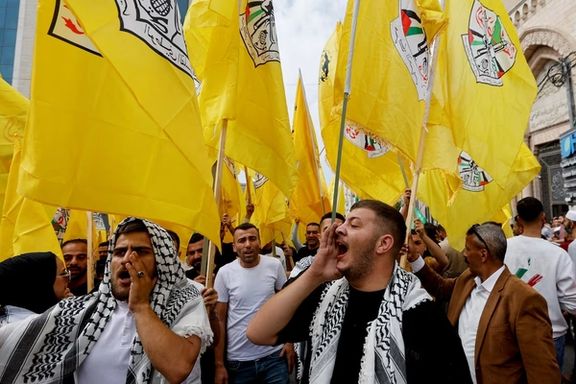
The main Palestinian faction in the occupied West Bank on Wednesday accused Iran of trying to spread chaos in its territory and said it would oppose foreign operations that had nothing to do with the Palestinian cause.
Fatah, the movement that controls the Palestinian Authority, said it would not allow "our sacred cause and the blood of our people to be exploited" and said it would act against any interference from outside aimed at harming security forces or national institutions.
Israel has long accused Iran of helping Palestinian armed groups including Hamas, which led the October 7 attack on Israel, and which has become more deeply entrenched in the West Bank over recent years.
The leaders of Hamas and Islamic Jihad visited Iran last week, attesting to the Tehran's growing influence on Palestinian politics, almost six months after the attack on Israel.
In addition to financial and logistical support, Tehran does everything it can to tilt the balance of power among Palestinian factions away from the Palestinian Authority and towards Hamas and Islamic Jihad, whom, unlike Fatah, Iran considers friends and allies.
Last month, the Israeli military said security forces had stopped advanced weapons including anti tank mines from being smuggled into the West Bank.
In the past, Iran has not denied providing support to the armed groups, saying whatever backing it gives is at the request of the Palestinians.
The statement from Fatah came as the Palestinian Authority has asked the United Nations Security Council to vote this month to make it a full UN member, a move that would add to mounting global pressure for a two state solution with Israel.
Occupied by Israel after the 1967 Middle East war, the West Bank has been at the heart of decades of conflict with the Palestinians, who want the area as the heart of a future independent state that would also include Gaza and have East Jerusalem as its capital.
(With reporting by Reuters)
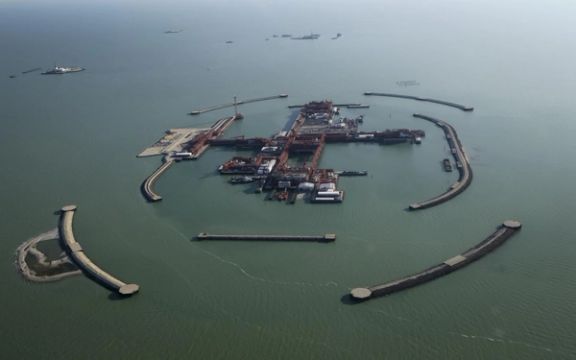
A possible oil spill in Kazakhstan's Kashagan Oilfield has sparked concern in Iran with pollution risks to the country's Caspian Sea coast.
Globus, an environmental organization in Kazakhstan, reported that satellite imagery had detected a significant oil spill in the northern Caspian Sea vicinity of Kashagan. Galina Chernova, director of Globus, shared on Facebook that images from the European satellite Sentinel-1A depicted a slick spanning approximately 7 square kilometers (2.7 square miles).
However, North Caspian Operating Company, primarily owned by Western oil majors such as Shell and Exxon Mobil, overseeing the Kashagan field, dismissed the claims, attributing the satellite images to a different, natural phenomenon.
The oil pollution in the Caspian Sea poses a significant threat to Iran's environment and economy. As one of the Caspian littoral states, Iran is particularly vulnerable to the consequences of oil spills and pollution in the region. The spills not only endanger marine life and ecosystems but also impact Iran's fishing industry, which relies heavily on the health of the Caspian Sea.
The contamination can also affect coastal communities and pose health risks to residents who rely on the sea for their livelihoods.
Iran stands as the sole Caspian Sea littoral state refraining from oil and gas extraction activities, contrasting with Russia, Azerbaijan, and other nations which have collectively invested over $160 billion in Caspian fields.
In 2024, all littoral states, with the exception of Iran, are striving to boost oil and gas production from the fields. Their combined output from the fields amounted to over 1.2 million barrels per day of oil and 50 billion cubic meters per year of gas in 2023.
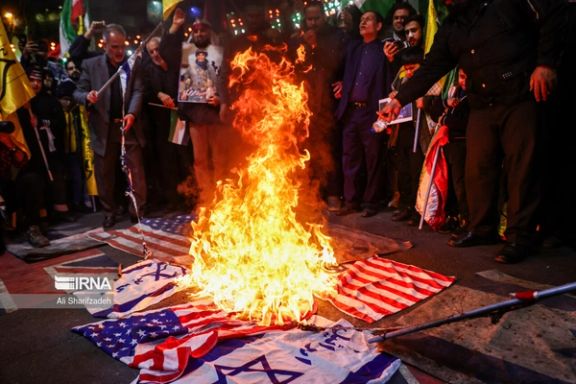
Numerous commentators in Tehran urge a measured reaction to Israel's Monday attack on Iran's embassy in Damascus, cautioning that the strike could be a ploy to draw Iran into direct conflict.
The air strike, reportedly launched by an Israeli F-35, flattened a building in the diplomatic compound on a national Iranian holiday, killing two senior Revolutionary Guard generals and five other officers. The incident is seen as the hardest blow at the clerical regime and its regional ambitions since Quds Force commander Qasem Soleimani was eliminated in a similar US strike in Baghdad in January 2020.
Supreme Leader Ali Khamenei vowed revenge on Tuesday, saying in a statement that “The nefarious regime will be punished by our brave men. We will make them regret this crime and other ones like it, by God's will.” Now, the Iranian regime must retaliate to save face, but any direct attack can spark an open war with Israel, a scenario many believe Tehran wants to avoid.
Media outlets in Tehran that do not directly belong to the government or the Revolutionary Guard, published numerous opinions on Wednesday urging caution.
Heshmatollah Falahatpisheh, a prominent commentator and former head of the Iranian parliament's foreign policy committee, strongly indicated that the Israeli attack on the embassy was a deliberate ploy to entangle Iran in a war. “We should not see the issues emotionally. I have said many times since October 7th that this is a trap for Iran. Since October 7th, the trajectory of events has been a setup to drag Iran into war, and what happened was that the balance between diplomacy and the battlefield was disrupted. This imbalance gradually led Iran into a conflict that serves none of its national interests.”
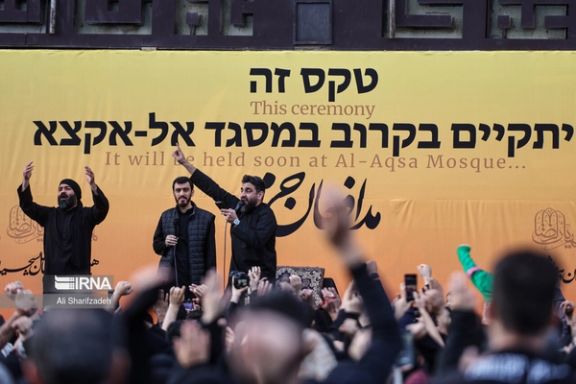
Qasem Mohebali, former head of Iran’s foreign ministry Middle East section, told Faraz Daily website that Netanyahu would like to expand the war to save his premiership, which is under attack by disenchanted Israelis. Netanyahu aims to “to escalate the war and involve Iran, the United States, and the West in it, while also neutralizing the Arabs. Therefore, Israel's objective in this matter is clear, and it remains to be seen what the next steps of both sides will be,” he said.
Fararu website published an interview with political commentator Abdolreza Farajirad, who argued that Israel, and especially Prime Minister Benjamin Netanyahu, currently face numerous challenges. Therefore, Israel is planning a wider war with Hezbollah on its northern border to push Iran’s most powerful proxy military force away from its territory. To make such a conflict winnable, Israel wants to disrupt the supply chain from Tehran to Beirut, and hence more attacks on Iranian targets in Syria.
While these commentators sounded cautionary notes, hardliners in parliament and elsewhere called for a harsh response to Israel, without receiving much resonance from others. It is not clear if the government is encouraging commentators who are allowed to speak to the media to express their concerns about escalation. Government censored media in Iran is not allowed to speak to any political activist or pundit on sensitive issues.
One notable exception among the media was the Asr Iran website, which argued in an analysis that if Iran fails to respond forcefully to Israel, it will embolden the enemy to launch further attacks. The website contended that weakness would only invite aggression. It refuted the notion that Israel may not seek a wider conflict and therefore Iran should exercise self-restraint. According to Asr Iran, if Israel is not prepared for direct conflict, Iran can respond without fear of escalation. In conclusion, the website emphasized that Iran has nothing to lose and everything to gain from a forceful response.
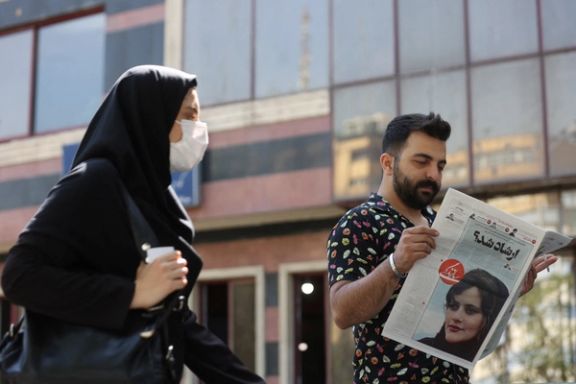
This year alone, the Islamic Republic has arbitrarily prosecuted at least 91 journalists, media activists and outlets, as indicated by the latest report from the Defending Free Flow of Information (DeFFI).
In its latest quarterly report, the non-profit organization which monitors and documents press freedom in Iran, says Tehran is continuing its systematic and targeted suppression of media and journalists.
Twelve journalists and media activists were also arbitrarily arrested – with three journalists transferred to prison and nine journalists summoned by judicial and security authorities.
The home of one journalist was raided by the regime’s security forces, while the property of another was confiscated.
A news agency also expelled its news photographer for criticizing government officials, the report said.
During this period, 24 journalists and media executives were sentenced to a cumulative 14 years and seven months in prison – and fined a total equivalent of over 15 million US dollars.
The sentences also included travel, work and social media bans for many of the journalists.
In nearly 100 instances, media professionals have been denied family visits and access to a lawyer, experienced confiscation of personal belongings without legal judgment, and subjected to extrajudicial imprisonment in solitary confinement.
During the first three months of 2024, the most common accusation against journalists and media activists in Iran has been "publishing lies to disturb public opinion," comprising 64% of legal cases.
The organization says this is emblematic of the Islamic Republic’s systematic effort to discredit journalists and non-governmental media outside the bounds of criminal law.
Earlier this week, the Persian-language site of the International Federation of Journalists released its annual report on the suppression and pressure on Iranian journalists over the past year.
That report, cites that at least 27 journalists and media activists were detained, 27 journalists were summoned, and 21 others were sentenced to punishments including imprisonment.
Other issues such as expulsion from the workplace, deprivation of employment for some journalists, and the detention, suspension, closure, and revocation of publishing licenses for some newspapers, were also cited in that report.
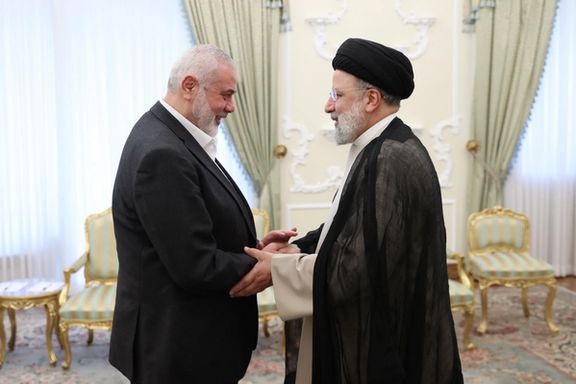
Iranian President Ebrahim Raisi has accused the West of providing financial, military, and media support to Israel, claiming they too will become targets of revenge attacks.
"Undoubtedly, this [Israel] regime and its supporters will face the consequences of this terrorist and brutal crime, and the punishment of the perpetrators of the crime is definite and irreversible," stated Raisi during a phone conversation with his Syrian counterpart Bashar al-Asad on Tuesday, as reported by IRNA.
Raisi's remarks come in the wake of an Israeli attack on Tehran’s consulate in Damascus, which resulted in the death of seven Revolutionary Guards, including two generals on Monday.
The bombing represents an unprecedented escalation of hostilities that began on October 7, when Iran-backed Islamist militia Hamas invaded Israel, resulting in the death of 1,200 mostly civilians and the capturing of 250 or more hostages.
"Unfortunately, the inaction and weak position resulting from the fear of some Arab countries have prevented the adoption of a unified Islamic stance against the Zionist regime and have made the regime more audacious in committing crimes," he added, in an attack directed at the Muslim world.
Tehran has particularly openly slammed countries such as the United Arab Emirates and Bahrain for their diplomatic ties with Israel, which resulted from the US-brokered Abraham Accords of 2020.
Tensions have spread throughout the Middle East since the commencement of the Gaza conflict. Thus far, Tehran has avoided direct clashes with Israel while backing proxies involved in assaults on Israeli and US interests.
Iranian authorities often employ aggressive rhetoric, and chants of "Death to Israel" persist as a regular occurrence at state-sponsored gatherings.
